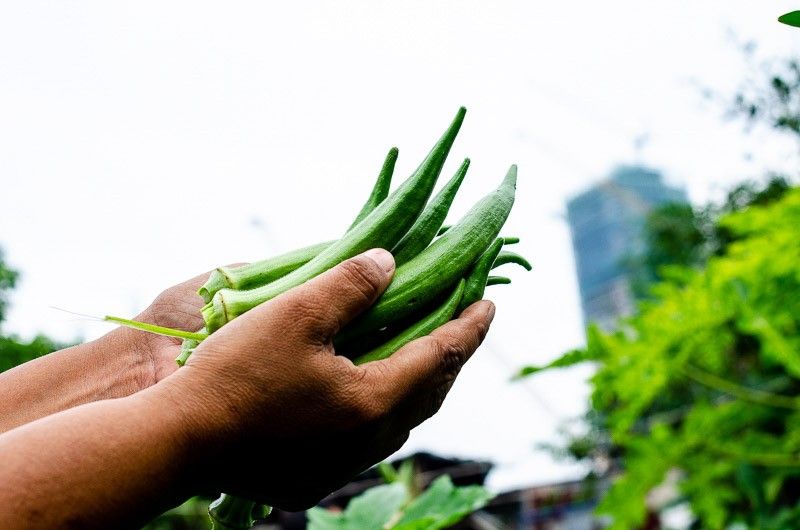Their right to the city: Garden grows sense of community amid precarity

MANILA, Philippines — At a little past 5:45 a.m., 38-year-old Gelyn Rosillo makes her way to a small patch of vegetation at the edge of her community in Quezon City while the rest of the neighborhood sleeps.
It’s time to transfer the mustasa (mustard), she says.
Just outside the garden perimeter, 47-year-old Marilyn Laput passes by, hauling pails of water to home. She eventually joins Rosillo, and, together, they transplant rows of seedlings.
Soon, more volunteers trickle in as the sun rises higher in the sky. Some are holding shovels and trowels, while the others carry cups of steaming coffee.
Clearly, caring for greens is a morning affair.
The gardening project was initiated as a response to the scarcity of work and food because of the pandemic.
"The community and Save San Roque Alliance initiated this program during the most critical point in the pandemic: Vegetable prices soared, and people had no money because of the ‘No Work, No Pay’ policy," Rosillo, who is a familiar face at the gardening project, said in Filipino.
Save San Roque is a group of professionals helping the community push for decent and pro-poor housing and, more broadly, for the rights of the urban poor in the city they live in.
While many Filipinos have adapted to work-from-home arrangements, many more remain as day workers in industries where remote work is not an option. Others work in the informal economy, where there are even fewer protections.
Fast forward to mid-2021, this early morning parade of locals going to the taniman—their name for this plot of land—has now become a common sight here in Sitio San Roque.
Marilyn Laput, who also grows her own vegetables like okra and chili peppers, sees the taniman as a way to help out their neighbors in need.
"Many [residents] are thanking us for this initiative. They tell us that if not for this, they would have nothing to turn to; some have been eating only salt with rice," she says in Filipino.
The communal garden has brought together a diverse community: Homeowners have been inspired to grow their own food and other plants, adding more color to their spaces that are slowly being taken up by demolished houses and construction, and walled off by rising skyscrapers.
More than the seedlings taking root in the taniman, however, the people are reestablishing their ties to one another in a community whose cohesion has been challenged by changes in their environment and in the way they have related to each other.
Eleven years ago — on Sept. 23, 2010 — the locals stood their ground along EDSA, as police and local enforcers tried to take away their residences and clear land for a commercial project in the area.
The commercial area and the community have, for more than a decade, had a tense co-existence as development and construction continues.
On that same road, 21 residents were arrested in 2020 — at the onset of the pandemic — over physical distancing protocols when they gathered on the street to call for food aid that they had been told would be distributed that day. The food came later that afternoon but the cases against the 21 reached court only this year.
The community has survived countless attempts to demolish their homes, fights between neighbors, fires, and harassment by security guards and the police.
But the true significance of this place lies not in conflict, but in the individuals residing within, and how, through companionship and genuine care for one another, they have managed to develop it into something they could truly call home.
Estrelieta Bagasbas — 66 years old, a local leader in San Roque, and Nanay Inday to all — sees the unifying influence that the taniman has had on their neighborhood.
"The taniman is special because [we] are able to encourage the mothers to participate. Even in a pandemic, you can see that they are all willing to help.
"And [for us, we are striving to instill among our fellow residents] that initiative to help others, especially those who have been weakened by this crisis," she says in Filipino.
The pandemic has been marked by necessary isolation and a fear of other people, but it has also seen moments of mutual aid and the community solidarity that society needs in times of crisis.
As much as the vegetables and greenery grown there, the harvest from Sitio San Roque's community garden is the value of collective action in the face of adversity.
- Latest






























